"Sweet Cherry Wine" by Tommy James & the Shondells (1969)
My favorite protest songs of the 60s and early 70s
This is the sixth in a series about my favorite protest songs from the sixties and early seventies.
We’ve already listened to five songs, in case you missed them:
“Blowin’ in the Wind” by Bob Dylan (1963)
“Masters of War” by Judy Collins (1963)
“Eve of Destruction” by Barry McGuire (1965)
“For What It’s Worth (Stop, Hey What’s That Sound)” by Buffalo Springfield (1966)
“Gimme Shelter” by the Rolling Stones (1969)
I’ve also shared NickS’s post asking “What makes a good protest song?” in which he gives his own list of favorites, and Jackie R’s post sharing a song that makes fun of protest songs.
Today we focus on a song that seems to be the exact opposite of our last protest song from the Rolling Stones and yet has a surprising connection.
Protest song of the day
When I shared guitarist Keith Richard’s recollections of the sixties in our last post about the Stones song “Gimme Shelter,” I held back an interesting anecdote from you. Here’s Keith again, in his autobiography, Life (2010), relating an incident that happened with Tommy James, the lead singer, songwriter, and guitarist for Tommy James & the Shondells:
“Sunset Strip [in Hollywood] in the ‘60s… The whole strip was filled with people, and nobody’s going to move for a car. It was almost off-limits. You hung out in the street, you just joined the mob. I remember once Tommy James, from the Shondells… I was trying to get up to the Whisky a Go Go in a car, and Tommy James came by, ‘Hey, man,’ ‘And who are you?’ ‘Tommy James, man,’ ‘Crimson and Clover’ still hits me. He was trying to hand out things about the [military] draft that day. Because obviously he thought he was about to be fucking drafted. This was Vietnam War time.”
Tommy James did not get drafted, and, by 1969, he and his band had put out six studio albums and achieved a string of Top 10 hits, including my favorites “I Think We’re Alone Now” (#4), “Crimson & Clover” (#1), and “Crystal Blue Persuasion” (#2). If you haven’t heard these, stop now and give them a listen, as fifty-some years later they are still fabulous songs.
My other favorite, released in April of that year, was “Sweet Cherry Wine.” As a seventh-grader I would sing along to the chorus while rueing the fact that I wouldn’t be getting any of this delicious drink one of my favorite groups devoted an entire song to exalting. ‘Does it taste like cherry soda?’ I wondered.
Little did I and most people know that this song was in no way, shape, or form about a delectable alcoholic beverage.
We need to rewind and hear the backstory of Tommy James & the Shondells before we can begin to make real sense of it. The story is actually a pretty incredible one.
The band’s first song, a cover of “Hanky Panky,” became a sleeper hit in Pittsburgh in 1965 when dance promoter Bob Mack dug up the all-but-dead single put out by Midwest label Snap Records a year earlier and made it into a local hit. Bootleggers sold a whopping 80,000 black market copies, and in April 1966, Tommy got a call from Pittsburgh DJ “Mad Mike” Metro(vich) informing him of its success and asking him and the band to come perform. The only problem was, the Shondells had already disbanded. Not to be deterred, Tommy went anyway to make promotional appearances and, while there, discovered a local band, the Raconteurs, who agreed to become the new version of the Shondells.
The band headed for New York City to shop the single to the record labels and, to their utter joy, got offers from every single one. The very next day that joy turned to dismay when a deluge of phone calls informed them that those offers were being rescinded. They finally found out why. The head of Roulette Records, Morris Levy (on the right in the photo below), had called all of the other label heads and told them in no uncertain terms that Tommy James & the Shondells would be his, and they all agreed. Why? Because Roulette Records was a front for the Genovese crime family, aka the Mafia.
Ironically, it turned out to be an incredible blessing in disguise for the band, as Roulette desperately needed some hits and Tommy was given carte blanche and sufficient resources to indulge his creativity however he desired. He believes the group would have been stifled or ignored at a bigger label and become a one-hit wonder. Instead, it became a consistent hit-maker as well as an innovator, pivoting from a focus on AM radio Top 40 singles to FM album rock and making videos ahead of the music industry curve.
By late 1966, however, Tommy had already become a physical and emotional mess, addicted to alcohol, uppers, and downers — from the musician lifestyle, not from partaking in any Genovese product lines (if I understand correctly) — and stressed out from having to walk on eggshells with Morris Levy and his consiglieri while trying to meet their ignore-at-your-own-peril expectations to produce, record, and perform hit songs.
It was on tour that November, in a hotel room in Pennsylvania, that he began to experience a dramatic shift in his state of being when he found a Gideons Bible in the nightstand drawer and randomly opened it to a UFO story in the book of Ezekiel. As he read those passages, he felt that God was speaking to him.
Quick sidenote: Growing up in Endwell, I went to a church where one of the ministers, Reverend Barry H. Downing, wrote a book on the appearance of flying saucers in the Bible. That book, first published in 1970, is available on amazon today.
Returning to our story, four months after that first spiritual awakening, Tommy had another religious experience that ended up changing his life forever and taking his music in an entirely new direction:
“I was brought up Catholic, but I really didn't know my faith very well, didn't know what I believed, why I believed what I believed. And in 1967 I was listening to Billy Graham at Shea Stadium on television (see photo below). And we were writing, as a matter of fact, and I put the guitars down and started listening.
“And he just gave the most amazingly lucid teaching on why Jesus came. And I had never heard it put quite that way before. I had heard a lot of over-my-head sophisticated kind of things growing up. But I never really heard the gospel message quite like that. And there's a moment, I equate it to hitting a champagne glass — a crystal champagne glass with a fork, you know how you get that pure tone? That's kind of how I felt when I heard Billy Graham explain why Jesus came. And I knew I'd heard the truth. It's too simple and too beautiful to not be the truth, and not be God. And I was actually high at the time, it's true. It just cut right through everything that was going on with me, and I just got right up to the TV and put my hand on the TV and made my commitment right there.”1
Within two years all of the other members of the band made the same commitment, and from 1967 to 1971, whether because of the support they received from the Father above or their earthly Genovese godfather (or both), the band experienced an extraordinary level of success, wracking up 11 Top 40 singles and six Top 10 hits.2 The single for “Crystal Blue Persuasion,” a song Tommy wrote about becoming a Christian, sold an astounding 5.5 million copies in just eight weeks.
In April 1969, the group’s single “Sweet Cherry Wine” was released and eventually reached #7 on the Billboard Hot 100. The band knew that people assumed them to be a psychedelic group and the song to be about drugs, but no matter. The Holy Spirit was in the song.
And the overarching message was also clear in the lyrics. They didn’t answer to the government but to a higher power, and only that power, God, has the right to take a life. The singer and his friends wouldn’t be marching off to war anymore; instead they would be drinking sweet cherry wine, or what Tommy revealed in interviews to be “a metaphor for the blood of Jesus.”
Lo and behold, surprise of all surprises, “Sweet Cherry Wine” is an anti-war song.
Quite a powerful message buried in this catchy little tune. I challenge you to hear it without singing along. I can’t say what it might do to your beliefs, but, if you’re like me, the melody alone will inject a welcome bit of joy into your day.
And I also ask you, what does the beginning of the song remind you of?
It’s funny how things take on a new meaning when looked at through a different prism. Enjoy!
If you want to know more, Tommy James has a website — tommyjames.com — and an autobiography, Me, the Mob, and the Music, which is in the process of being made into a biopic.
Song credits
Songwriters - Richard Grasso, Tommy James
Producer - Tommy James
Tommy James and the Shondells:
Tommy James – lead vocals, rhythm guitar, keyboards
Eddie Gray – lead guitar, backing vocals
Ronnie Rosman – keyboards, backing vocals
Mike Vale – bass guitar, backing vocals
Pete Lucia – drums, percussion, backing vocals
Technical:
Bruce Staple – engineer
See footnote 2.
According to Tommy James’ official site (tommyjames.com), he had 32 Billboard Hot 100 hits, 23 gold singles, 9 platinum albums, and about 110 million records sold worldwide, most of these with the Shondells in the period from 1966 to 1970, at which time the group disbanded and he went solo. There have been over 300 covers of their songs, and the songs have been used in an estimated 65 movies and 53 TV show soundtracks (as of July 2019, per https://variety.com/2019/film/news/tommy-james-biopic-me-the-mob-and-the-music-development-1203271345/).

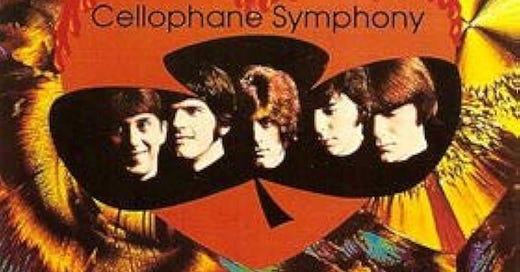



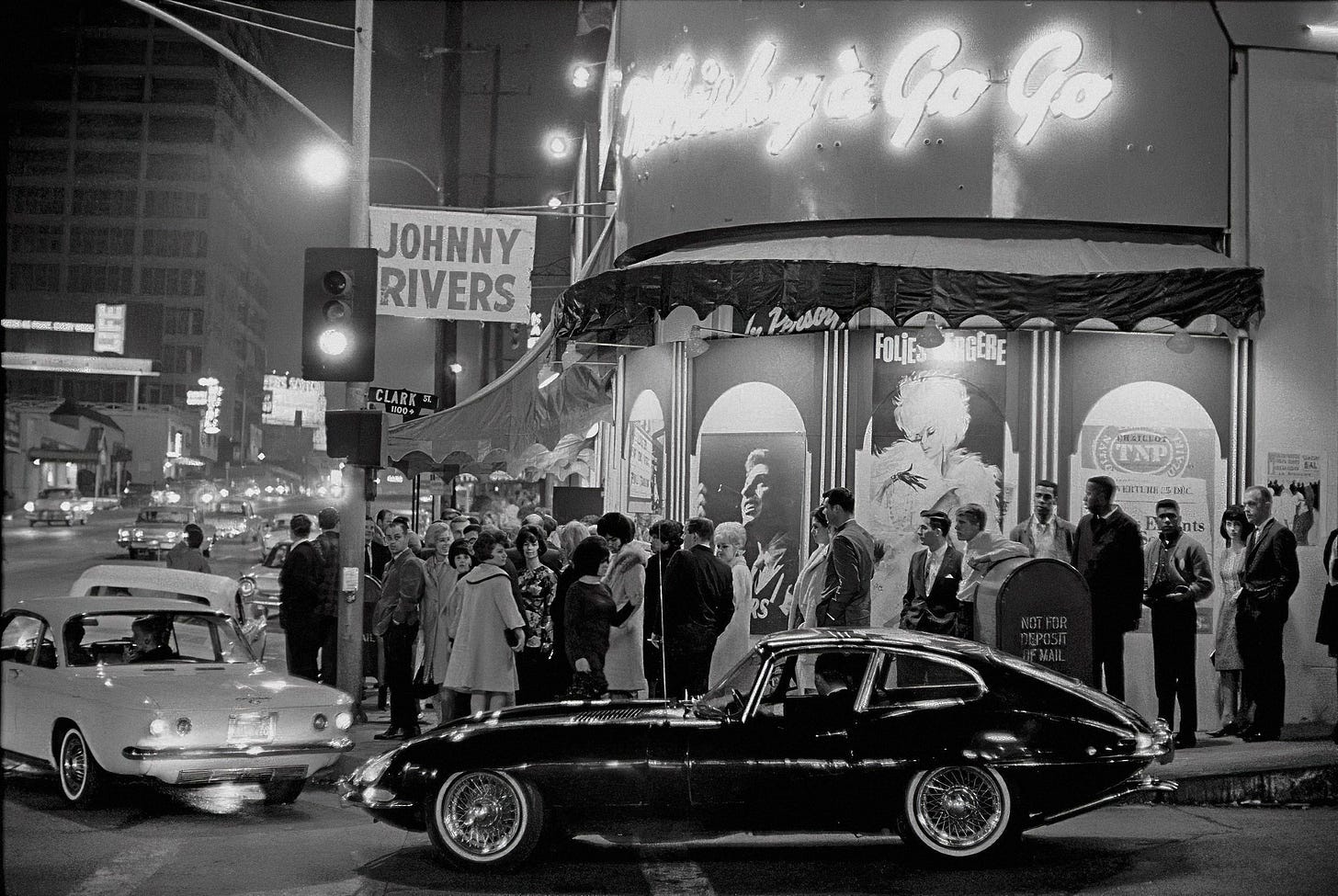
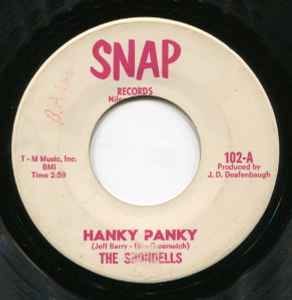
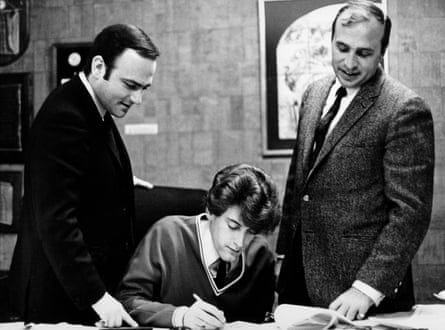
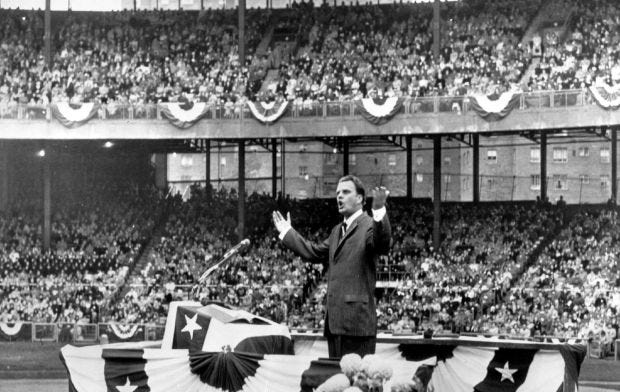
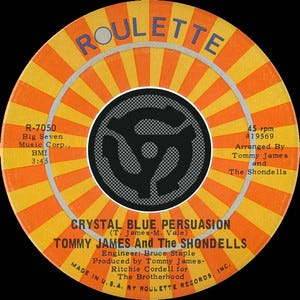
So interesting. Great article! Because I grew up at the time of these popular songs, and they are etched into my brain, still love hearing them when they pop up - usually on the Sirius channels of the hits from the 60's and 70's. Nice Ellen!
Interesting details on Tommy James! I have to admit to never having heard this song before. I know his other big hits but this one slipped by me!